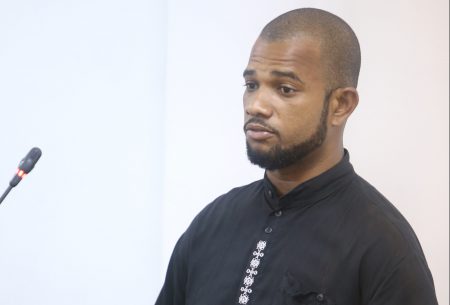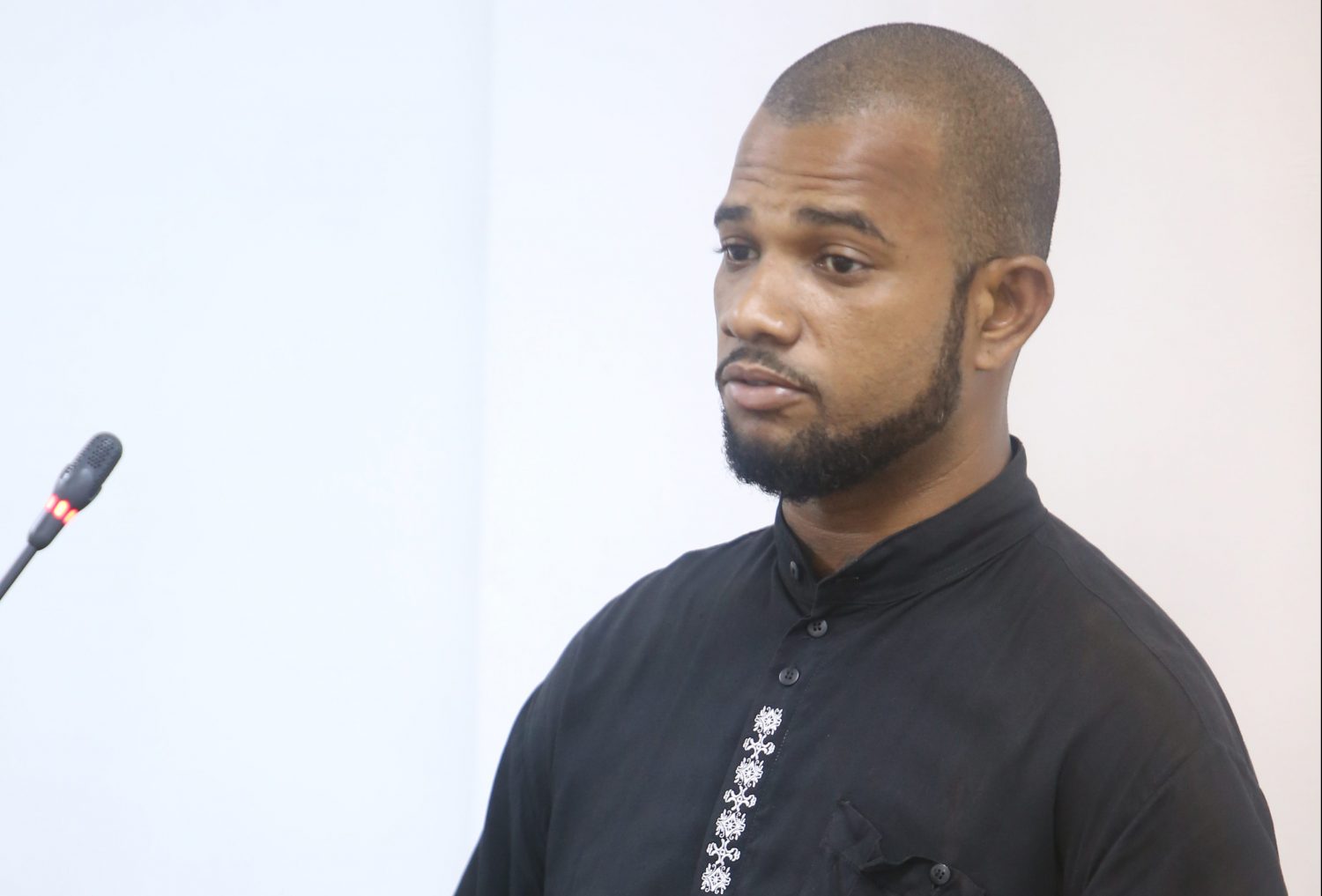Journalist Travis Chase yesterday told the Commission of Inquiry (CoI) into the alleged plot to assassinate President David Granger that he believed that the police were covering up the matter.
Chase broke the story detailing the alleged assassination plot in April of this year based on interviews he conducted with Andrif Gillard, who implicated businessman Nizam Khan as having orchestrated the plot in 2015.
During the course of his testimony yesterday at a hearing at the Department of the Public Service on Waterloo Street, Chase was asked by attorney Ian Chang SC whether he felt Gillard was trying to bring public attention to the incident at the time he approached him, to which Chase said he could not recall.

Asked how he felt now, Chase said that he felt the police are covering up the matter. His statement led Chang to put the original question back to him as his answer had no relevance.
Later on, Chang would ask whether Chase harbours any animosity toward the police force, while suggesting that such may have resulted in him making the aforementioned statement.
His enquiry was labelled “inappropriate” by Chase’s attorney, Selwyn Pieters, however. Chang’s later question of whether Chase had ever been charged was not easily allowed by the commission as it also received strong opposition from Pieters, who stated that such a question was impermissible.
Chang argued that his question had relevance to Chase’s credibility as a witness and his answer would show that he was “partisan.”
After much back and forth, with the Chairman of the CoI retired Assistant Commissioner of Police Paul Slowe even saying that the question was not “fair,” the enquiry was eventually allowed when Chang rephrased, and instead asked if Chase has ever been convicted for an offence “involving dishonesty.”
After slight hesitation, Chase detailed an instance a few years ago where he was charged with simple larceny and pleaded guilty to the offence due to what he explained was a lack of evidence in his favour.
Pieters, when re-examining Chase, asked whether he has assisted the police before and whether he has ever used the police as sources for his stories. He responded affirmatively to both queries.
Attorney Christopher Ram, who represents Imran Khan, the brother of Nizam Khan, questioned Chase thoroughly on the extent of his professional capacity and the role he played while interviewing Gillard.
He asked how long before Gillard approached Chase the offer was allegedly made, to which Chase said he could not recall.
Putting to him that it was 21 months prior, Ram queried whether Chase had sought to find out why Gillard was only coming forward then.
Chase said the question did cross his mind and that it was asked though he could not recall the answer. He referred Ram to the disc containing a recording of the interview, as he did for many of the questions that followed.
Verification
Ram asked Chase whether he had followed the basic precepts of checks and balances outlined by him, including verifying information.
Chase explained that he had asked Gillard to recount the story three times before he finally decided to record and he stated that the story rang true and that Gillard related the same story each time.
Furthermore, he had not aired the interview until he got a confirmation that investigations were underway, albeit weeks later.
Reading out his witness statement at the beginning of the proceedings, Chase said that on March 26, (which is three days before Gillard would have visited the CID and the very day his acquaintance Leon Baldeo said Gillard asked him to support his story), he received a call from Gillard informing him that he had been offered money to shoot the president.
“On March 26, 2017, Mr Andrif Gillard rang me and informed me that he was offered $6 million to shoot Mr David Granger, President of the Cooperative Republic of Guyana, during one of his outreaches or possibly before Mr Granger had moved from his D’Urban Backlands home. I then invited Mr Gillard immediately to come down to the studio to have these allegations recorded on camera for possible broadcast on the HGP Nightly News,” Chase began.
He said Gillard came on March 30, 2017, to record the interview, which is reportedly the day after he would have visited the Criminal Investigation Department (CID). Chase said Gillard reported to him that he was offered $7 million by Khan to kill the President and then went on to detail the alleged encounter.
This point in Chase’s testimony was brought up by Chang in his cross-examination, when Chase admitted that Gillard had changed the figure when he retold the story, but said he explained why this was so.
Chang did not prod, but earlier testimonies before the commission had revealed that Gillard had approached Khan in 2015 and asked to borrow $6 million, when he was allegedly offered the $7 million, which he reportedly would not have to repay, for the alleged assassination.
Chase related that when Gillard came for the March 30 interview, he said the police were not taking his complaint seriously. He said that later that same night, Gillard called and said that Khan was at CID and behaving in a disorderly manner and that the police wanted to place Gillard under arrest. Chase said he advised Gillard to “stay calm and comply“, and later during cross-examination, said he had heard some of the “confrontation” over the phone.
According to Chase, on the very day the video recording was made, he immediately contacted the then Head of the Presidential Guard Brian Joseph and related to him the conversation he had had with Gillard.
“Mr Joseph immediately made his way up to HGP Nightly News, where he was provided with a disc of the recording I did with Mr Gillard. On the said day of the recording too, I contacted head of the Special Organised Crime Unit (SOCU) Assistant Police Commissioner Sydney James and told him of the recording. Mr James advised that such a matter is very sensitive and that I should also report this matter to the high authorities. On that day too, Mr James was provided with a copy of the interview,” he continued.
Grave concerns
Chase stated that he had tried on several occasions to make contact with Crime Chief Wendell Blanhum but to no avail. To his disdain, however, he stated that on April 21, the Commissioner of Police Seelall Persaud and the Minister of Public Security Khemraj Ramjattan accused him of not making attempts to notify the relevant authorities.
“I held on to the interview for weeks, all this time trying to find out from the police what, if anything, was being done in relation to this matter. On April 20, 2017, I continued to have grave concerns with how this matter was being handled given my interviews with Mr Gillard and the conduct he related to me by the police. I attended the post-Cabinet media briefing and I enquired from the honourable Minister of State Joseph Harmon whether or not the government was informed of an alleged plot to assassinate the president and what was done by the police to investigate the matter. The minister confirmed the report and the ongoing investigation,” he added.
With this confirmation, Chase ran with the story. He reported that after the interview was aired, he was followed by several police operatives, one of whom reportedly trailed him on a motorbike. The incidents, he said, were reported to then ‘A’ Division Commander Clifton Hicken.
Chase said that on April 25, he encouraged Gillard to present himself for a confrontation, which the man reportedly said took place with the “cousin of the accused,” after police reported that they could not get in contact with him.
The reporter expressed surprise at this as he said he had never once experienced difficulty reaching Gillard.
Evidence presented is that the confrontation involving Leon Baldeo was held on April 25.
Balram Baldeo, the father of Leon Baldeo, who has accused Gillard of offering him $50,000 to lie on his behalf and support his story, also testified yesterday.
Baldeo, asked about his son’s character, described him as “wayward” but also said he did not believe him to be deceitful, or capable or going to the extent that he would make up such an allegation.
Asked by Chang if he thought his son was the type of man that would go to the police and tell lies, Baldeo said that he did not think so.
While he admitted to knowing the Khans, and having been employed by their father years ago, Baldeo denied that the families were related.






